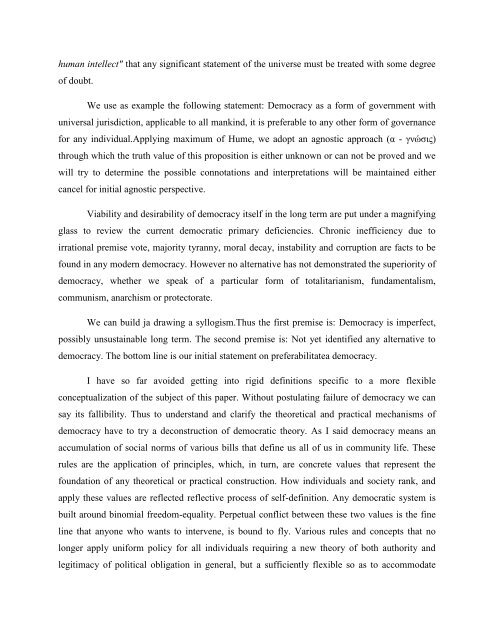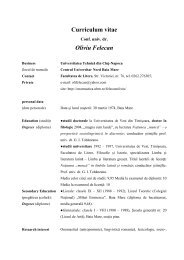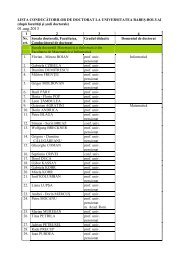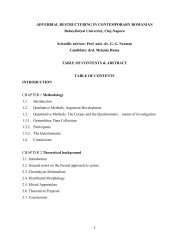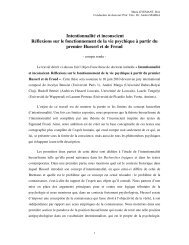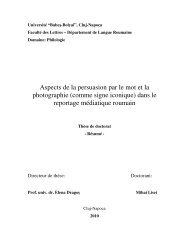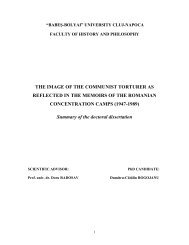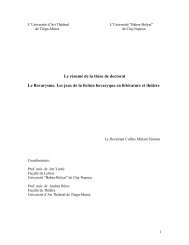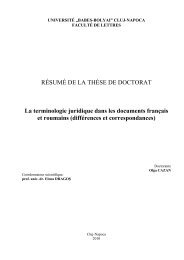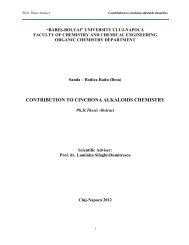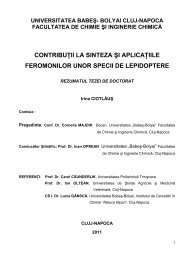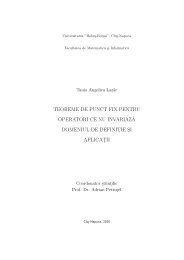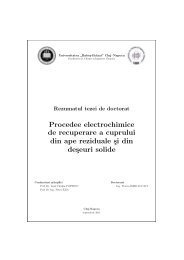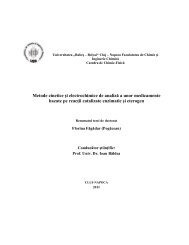Contemporary debates concerning the axiology of democracy
Contemporary debates concerning the axiology of democracy
Contemporary debates concerning the axiology of democracy
You also want an ePaper? Increase the reach of your titles
YUMPU automatically turns print PDFs into web optimized ePapers that Google loves.
human intellect" that any significant statement <strong>of</strong> <strong>the</strong> universe must be treated with some degree<br />
<strong>of</strong> doubt.<br />
We use as example <strong>the</strong> following statement: Democracy as a form <strong>of</strong> government with<br />
universal jurisdiction, applicable to all mankind, it is preferable to any o<strong>the</strong>r form <strong>of</strong> governance<br />
for any individual.Applying maximum <strong>of</strong> Hume, we adopt an agnostic approach (α - γνώσις)<br />
through which <strong>the</strong> truth value <strong>of</strong> this proposition is ei<strong>the</strong>r unknown or can not be proved and we<br />
will try to determine <strong>the</strong> possible connotations and interpretations will be maintained ei<strong>the</strong>r<br />
cancel for initial agnostic perspective.<br />
Viability and desirability <strong>of</strong> <strong>democracy</strong> itself in <strong>the</strong> long term are put under a magnifying<br />
glass to review <strong>the</strong> current democratic primary deficiencies. Chronic inefficiency due to<br />
irrational premise vote, majority tyranny, moral decay, instability and corruption are facts to be<br />
found in any modern <strong>democracy</strong>. However no alternative has not demonstrated <strong>the</strong> superiority <strong>of</strong><br />
<strong>democracy</strong>, whe<strong>the</strong>r we speak <strong>of</strong> a particular form <strong>of</strong> totalitarianism, fundamentalism,<br />
communism, anarchism or protectorate.<br />
We can build ja drawing a syllogism.Thus <strong>the</strong> first premise is: Democracy is imperfect,<br />
possibly unsustainable long term. The second premise is: Not yet identified any alternative to<br />
<strong>democracy</strong>. The bottom line is our initial statement on preferabilitatea <strong>democracy</strong>.<br />
I have so far avoided getting into rigid definitions specific to a more flexible<br />
conceptualization <strong>of</strong> <strong>the</strong> subject <strong>of</strong> this paper. Without postulating failure <strong>of</strong> <strong>democracy</strong> we can<br />
say its fallibility. Thus to understand and clarify <strong>the</strong> <strong>the</strong>oretical and practical mechanisms <strong>of</strong><br />
<strong>democracy</strong> have to try a deconstruction <strong>of</strong> democratic <strong>the</strong>ory. As I said <strong>democracy</strong> means an<br />
accumulation <strong>of</strong> social norms <strong>of</strong> various bills that define us all <strong>of</strong> us in community life. These<br />
rules are <strong>the</strong> application <strong>of</strong> principles, which, in turn, are concrete values that represent <strong>the</strong><br />
foundation <strong>of</strong> any <strong>the</strong>oretical or practical construction. How individuals and society rank, and<br />
apply <strong>the</strong>se values are reflected reflective process <strong>of</strong> self-definition. Any democratic system is<br />
built around binomial freedom-equality. Perpetual conflict between <strong>the</strong>se two values is <strong>the</strong> fine<br />
line that anyone who wants to intervene, is bound to fly. Various rules and concepts that no<br />
longer apply uniform policy for all individuals requiring a new <strong>the</strong>ory <strong>of</strong> both authority and<br />
legitimacy <strong>of</strong> political obligation in general, but a sufficiently flexible so as to accommodate


